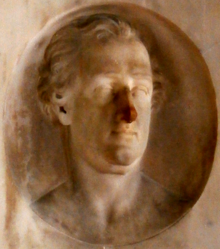Henry Carteret, 1st Baron Carteret
Henry Frederick Carteret, 1st Baron Carteret PC (birth name: Henry Frederick Thynne ; born November 17, 1735 in London, † June 17, 1826 in Haynes , Bedfordshire ) was a British nobleman and politician. He was elected to the House of Commons four times and was Postmaster General of Great Britain from 1770 to 1789 .
Origin and youth
Henry Frederick Carteret came from the Thynne family . He was born Henry Frederick Thynne, the second son of Thomas Thynne, 2nd Viscount Weymouth and his second wife Louisa Carteret, daughter of John Carteret, 2nd Earl Granville . He attended Market Street School in Markyate in Hertfordshire and studied from 1752 at St John's College , Cambridge , where he graduated as a master's in 1753 . In 1769 he became a doctor of law .
Career as a politician
After he was originally to run for Wiltshire , where most of the family's property was located, in the general election in 1757 , he was eventually elected as MP for Staffordshire , with the support of Lord Gower , a friend of his brother Thomas Thynne, 3rd Viscount Weymouth . In the next election in 1761, he was elected to Weobley , where the constituency was completely controlled by his family. After he had turned down the office of Groom of the Bedchamber , he was given the office of Clerk Comptroller of Board of Green Cloth , the administrative body of the royal household, in return for the support of the government of the Earl of Bute by his brother in December 1762 , whereby he had annual income of £ 1000. He lost this office in July 1765 when the government of Prime Minister George Grenville was overthrown.
In the House of Commons, Thynne now supported the opposition to the Duke of Bedford and rejected the stamp duty . When Augustus FitzRoy, 3rd Duke of Grafton became Prime Minister in 1768 , Bedford's influence gave Thynne the post of Master of the Household in March , but only had an annual income of £ 518. His brother Lord Weymouth, who had become Secretary of State , tried in vain to help him to a more lucrative office such as that of Ambassador in Madrid or that of Vice-Treasurer of Ireland , which probably failed because Thynne was King George III. was noticed as a rather passive parliamentarian. After the threatened war for the Falkland Islands in 1770, after which the government including his brother resigned, Thynne also lost his office in December 1770. But he received the post of postmaster general , which is why he had to resign his mandate, and on December 19, 1770 became a member of the Privy Council . In return, his brother Lord Weymouth Bamber Gascoyne had to be elected as the new MP for Weobley, who had to support the government's policies.
Postmaster General and Heir to the Carteret Family
Most of the work as Postmaster General was done by Secretary Anthony Todd, with whom Thynne was in debt despite the nearly £ 3,000 annual income he earned from the office.
After the death of his childless uncle Robert Carteret, 3rd Earl Granville , a brother of his mother, he inherited his property in February 1776 according to the will of his grandfather John Carteret, 2nd Earl Granville, which is why he took his surname Carteret . In addition, he inherited the office of High Bailiff for Jersey for life. On January 29, 1784 he was raised to Baron Carteret , of Hawnes in the County of Bedford , it was determined that he could inherit the title to younger sons of his brother Lord Weymouth. After his brother was promoted to Marquess of Bath, he gave up his post as Postmaster General in September 1789. From 1785 he had his country estate Hawnes Place near Haynes, presumably rebuilt by James Lewis .
Marriage and inheritance
He married Eleanor Smart (around 1741-1817) on July 9, 1810, who had previously been his lover for 43 years. He was buried in Kilkhampton Church in Cornwall. Having no children, his nephew George inherited his possessions and the title of Baron Carteret.
Web links
- John Brooke: THYNNE, Hon. Henry Frederick (1735-1826), of Compsford, Glos., History of Parliament Online, Ref Volumes: 1754-1790
- Henry Frederick Carteret, 1st Baron Carteret of Hawnes, on thepeerage.com , accessed September 24, 2015.
- Roland Thorne: Carteret, Henry Frederick, first Baron Carteret of Hawnes (1735-1826). In: Henry Colin Gray Matthew, Brian Harrison (Eds.): Oxford Dictionary of National Biography , from the earliest times to the year 2000 (ODNB). Oxford University Press, Oxford 2004, ISBN 0-19-861411-X , ( oxforddnb.com license required ), as of 2004
Individual evidence
- ↑ Cracroft's Peerage: Granville, Earl (GB, 1715-1776). Retrieved September 22, 2015 .
- ^ British Listed Buildings: Clarendon School, Haynes. Retrieved September 28, 2015 .
| predecessor | Office | successor |
|---|---|---|
| New title created |
Baron Carteret 1784-1826 |
George Thynne |
| personal data | |
|---|---|
| SURNAME | Carteret, Henry, 1st Baron Carteret |
| ALTERNATIVE NAMES | Thynne, Henry Frederick; Carteret, Henry Frederick |
| BRIEF DESCRIPTION | British nobleman and politician |
| DATE OF BIRTH | November 17, 1735 |
| PLACE OF BIRTH | London |
| DATE OF DEATH | June 17, 1826 |
| Place of death | Haynes (Bedfordshire) |

